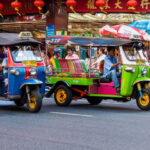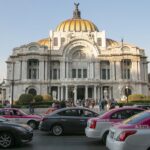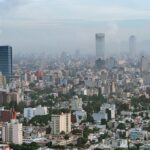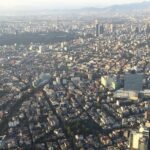Posts tagged with 'Mexico City'
On July 22, the world experienced its hottest day in recorded history. The global average temperature reached 17.2 degrees C (62.9 degrees F), prompting UN Secretary-General António Guterres to issue a global call to action on extreme heat. The problem of extreme ...

Bogotá, Colombia is in the throes of a water crisis. After several months of dry weather caused by El Niño, the Chingaza reservoir system, which provides 70% of Bogotá’s water, reached its lowest level in history. The city’s over 8 million residents are ...

Mexico became the first nation to declare access to safe mobility a human right in 2020 and two years later passed the General Law of Mobility and Road Safety to protect people, reduce collisions and promote sustainable modes of travel. Now, with this new ...

Bengaluru is one of the world’s fastest growing metropolitan economies. A favored destination for investors and talent alike, this leading innovation hub is one of the largest technology clusters worldwide and home to 400 Fortune 500 companies. However, the planning ...

Over 50% of all transport-related emissions come from high-income countries, where people are more likely to own and depend on personal vehicles. Meanwhile, less than 1% is generated by low-income countries in regions like sub-Saharan Africa and Latin America. In these ...

Achieving transformation in today’s cities requires the active and ongoing participation of many stakeholders, from the public sector, to civil society, private companies and academia. Non-government organizations can play a crucial role due to their commitment to improving the quality ...

Today’s city leaders face a level of complexity and rapid pace of change that can be overwhelming. Particularly in developing countries, urbanization is unfolding quickly and often haphazardly. One in three urban residents worldwide lack adequate access to at least ...

Getting around any megacity as dense and vast as Cairo, Egypt can be a challenge, even for the most able-bodied, well-traveled and well-informed commuter. The plethora of options for transport modes and routes has made it difficult to decode and ...

After two years of unprecedented disruption to transport globally and two years of virtual conferences, Transforming Transportation returned to Washington, DC, March 14-15. More than 900 policymakers, experts and leaders in transport gathered at the World Bank Headquarters to explore ...

Today, air quality awareness is common among Mexico City’s residents. People with respiratory conditions are consulting the official reports of the Atmospheric Monitoring System (SIMAT, for its Spanish acronym) before engaging in outdoor activities more frequently. Education authorities are aware of pollution ...

Water for human consumption is increasingly inaccessible, due to poor management, degradation of water sources, the effects of climate change and more. Marginalized groups — such as minorities, rural communities and women — are disproportionately affected by water security issues, and women often play a key ...

Crisis often sparks changes to the ways we move. Post-war prosperity made the automobile a household item, and lifestyle. The 1970s global oil and fiscal crisis brought a short-lived bike boom and a retreat of city dollars for public transit. ...

Remote sensing has revolutionized how we measure and understand the Earth. We can now track deforestation across the globe, predict end-of-season crop yields and identify wildfires in near real-time. But exploration into its possibilities for urban areas has only just begun. ...

Their goal is an ambitious one: make the world more prosperous by transitioning it from a linear economy that only works from inputs to outputs to a circular economy that loops both together. Instead of designing clothing to be cast ...

Left unchecked, urban freight will continue to be a major driver of the global climate crisis.

























